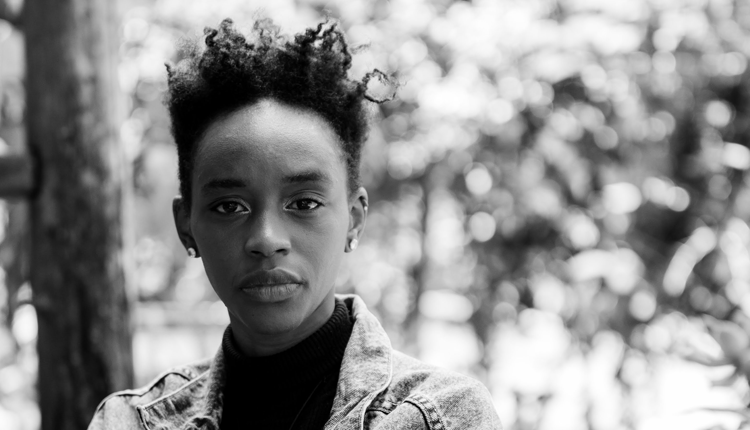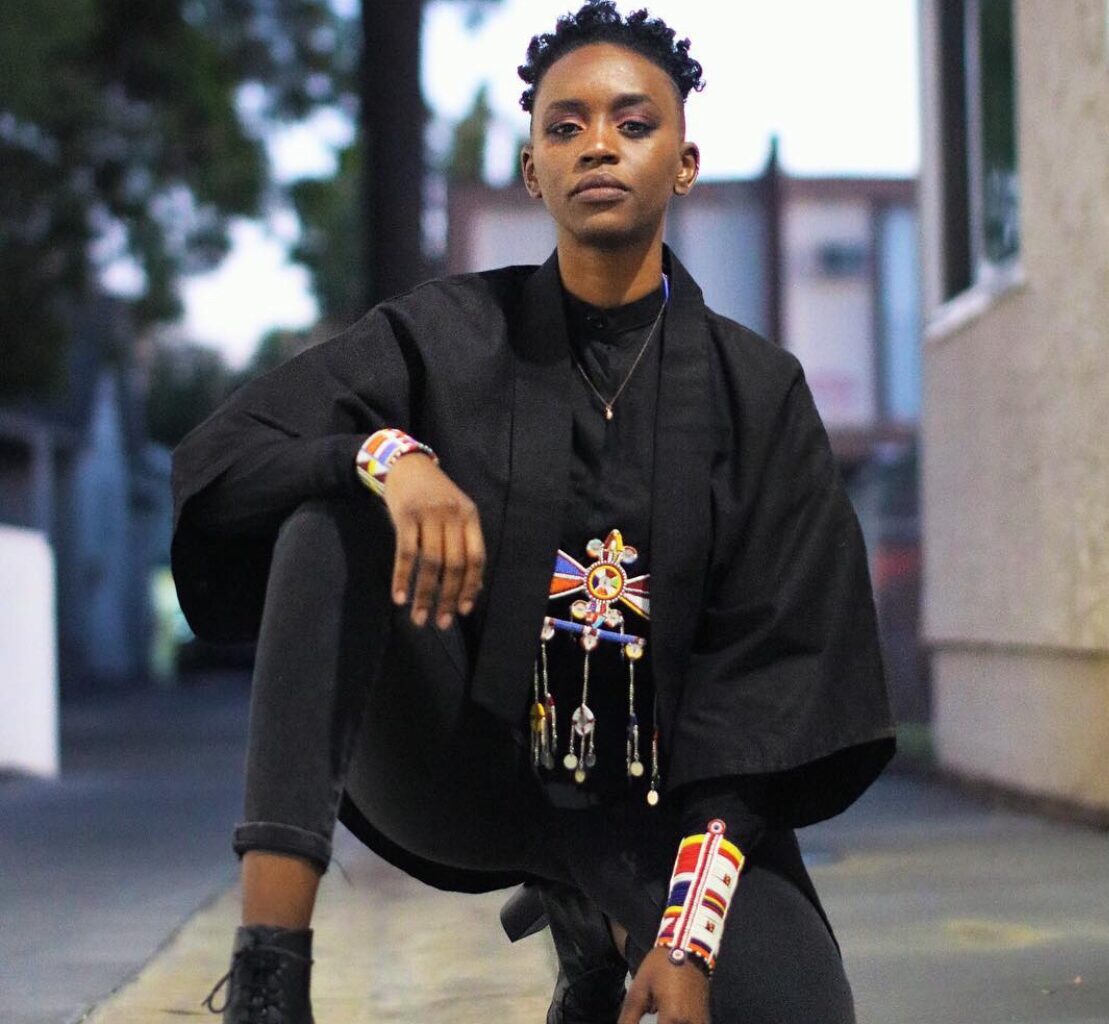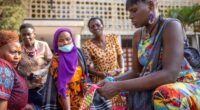By Khadijja Natasha Sebunya
Majestic will do, but breath taking was what I would have gone for if I did not feel the cliché a contradiction for someone that has worked so hard to maintain and emulates authenticity. Majestic in these wide legged red trousers, complimented with a tight black collar shirt that loosens only around the forearms and tightens again at the wrist, man! She is taking up space. On her feet are black platform boots. Njoki Karu is in a corner transfixed in conversation with who I assume is a singer. Her head is shaved on both sides and at the top is a modern twist out. She is an afro-futuristic vision. I wait my turn.
Her music speaks for itself. If you are new, Holes is a great beginning but Stay is what hypnotized Alliance Francaise’s director when he was going through his spotify one day, enough to get the ball rolling and have Njoki open the year with the first concert post lockdown. Already very popular, its only a matter of time before she explodes, but on January 29th Karu graced Kampala with her inimitable voice. EA Scene sat down with her beforehand to engage her on her purpose for music, gatekeeping in the industry and what COVID has done to us and if we can really move on.
Peeped your Instagram the other day, and I was really intrigued by your conversation on there about gatekeeping lets jump into it?
Njoki Karu: We have so much talent in Kenya, we have such incredible, so many incredible musicians and instrumentalists, but then it’s like, they go nowhere…and its not that they haven’t tried, it’s not that they haven’t done their best, it’s not that they can’t really write good songs, it’s just that it can get very systematic at times, where the people who are at the top, they do not create room for you once you start ascending and they even do what they can to stifle you.
Have you been a victim of gatekeeping?
Its not even just about me, it is what I see happen to other people, because for me I have been fortunate enough to not have to go through that system, such that even when you think about Rafiki, I did not have to hustle to be there, the director came up to me and she said I like your music, so a lot of it isn’t- I don’t have the words for it…but pretty much its people telling you that you are not good enough for what they expect and that you should change yourself.
READ ALSO: Nsimbi Drops Mbaga In Preparation For Infinity EP Release
Do you think your luck in escaping the gatekeeper has had to do with the fact that you went the formal training route?
No. It gives you an edge when people here that you went to Berklee but then a lot of artists, who did not go through formal training, are still very very good, but I just feel like it’s a rigged system. You can find someone that is very qualified, but they do not get the job. It all depends on if you know someone, and that can be a good thing to have someone speak for you in a room, to speak of your talents and ask that you get hired, but what happens today is not that. What happens today is that we can have a gig and the only people that can get to play at the gig are the people who know somebody even if they are not good, or evenwhen their music does not match up to the level of where Kenyan artists are. Its always sad seeing that happen because we have so much talent going unnoticed.
What do you think the solution is?
Honestly, there are so many different approaches and solutions, but talking about it is a first step. But then again, sometimes it’s hard to fault the people who are gatekeeping when you take into consideration the industry that we are in. I mean COVID showed us,
There is a very small pie.
It can also be very unstable so you find a lot of people do not stay there because they want to be there, they stay there because they have families to feed. Understandable, but not right. So, I feel that we definitely need to create that awareness but I also feel that people need to just get out of the mindset where we have been made to believe that you can only be a certain way to make it in this industry. We have been told that you have to look a certain way, play the “right” kind of music and then you will succeed. But then you look at people like Blinky Bill and people like Muthoni Drummer Queen, they did not do that, and they are still successful, outside of Kenya and outside of Africa which speaks to the fact that you can really be yourself and still make it, and I feel like a lot of musicians need to get to that part. It will be hard to break away from the formula, but if we all just say, that this is enough. Something can change, and of course if being yourself is a pop musician, then you should do that. The only real rule is that listen to what is inside your heart. A beginning to a solution therefore is conversations about the gatekeeping and artists breaking away from the formula.
READ ALSO: Kampala Night Life Opens After 2 Years Of Curfew
You did a project with people who had experienced trauma..Music therapy is what you do with your music, beyond entertainment, could you tell us a little about that.
I am a music therapist, and while it’s not a thing in Kenya, it is actually a thing here in Uganda. There are music therapists who work with children in early childhood, children living with special disabilities and in Gulu you have people who do work in Internally Displaced Camps with child soldiers, and that is why I wanted to do music therapy to begin with. Coming back into a new scene if I can call it that, but what I am trying to articulate is that I had left home, and I had not settled at home to be a musician or a music therapist before I left. Now, when I came home, I had this very clear idea of what I wanted to do with music therapy. I knew. I had a clear vision. This is what I am going to do, this is who I am going to talk to and then COVID happened and of course at that time many of us did not even have gigs to sustain ourselves. So at that time, I even had to do work outside of music. Which was very interesting, I enjoyed it but then the next step was how can I come back and do exactly what I want to do. So with the help of Safaricom, we were able to have a few sessions with people who are going through a tough time with COVID and that is who we were working with, we had one December of that year 2020 and December of 2021, and it was such, a heartbreaking realization what COVID has done to people, and this is maybe very graphic but there was a time during COVID, when we were going to see my parents, they live on the other side of Nairobi, and we lived in a place called Kamburu which is literally an hour away and we are going down this road called Wayaki and literally to the side….This is when COVID had just started. At most two months in and there was a guy who had hang himself on the side of the road. People had gathered and it had become somewhat of a spectacle, later on we found out that he had actually written down the cause of his suicide, and it boiled down to his inability to cope with everything that was going on— you know we had been asked to go into a lockdown, the country had been shut down, and for people that does not make sense because for artists and people who make money to eat everyday that was a very unrealistic position to be put in. The question that was posed to everyone was; will I die of COVID, will I die of hunger.

I have not been able to get back to music therapy because last year was too much for me to balance everything mentally but we are getting back to it this year again, its needed. Being able to be supported by Safaricom has been great, and to have them push funding in that direction has been awesome, to create a space, where people can come, and eat and they have music therapy and hang out for a bit, it is so needed. You know when our country opened up, there as no recognition of what had just occurred, no ease into it. I remember walking into a carrefour and I had not been outside for a very long time. Now I was outside with so many people just walking around, so many sounds and my anxiety picked because I had not been outside for a long time, and we saw it in our high schools, were children now started burning schools because they were fed up, and people don’t know how to put words to how they are feeling, because that is such a foreign thing, but for me it makes sense.
These kids have not been together for a long time, you put them back into school, they haven’t seen each other in a year and they have to catch up on two years of learning, and then they have exams and who knows what has been happening in their homes, and for me up until now, I feel like something has changed. The entire country and everyone’s mental space has taken a hit and I do not feel that we have been in positions where we have been allowed to process life was just expected to go to back to normal. But it couldn’t, it can’t. Everything has opened back up, social spaces have opened back up, work places have opened back up, gigs, but it can’t. it’s a great thing, it’s a good thing that we are able to resume life, but can we simply resume life?
I hope the conversation carries through.
But so much has changed even with money. And now, man someone put it so well. You either find someone who is very stingy or someone that spends all their money because you don’t know what is going to happen. If tomorrow there is going to be a pandemic, let me just live my life versus now they are people who are like, I will not spend anything. I will hoard this money because I don’t know what’s going to happen.
Hopefully you can touch on this with your work in music therapy.
I hope so, because you know, this was ours. With the dances, and a lot of things we used to do, with the sooth saysers, the healers, we had a lot of integration between music and healing it was such a central and essential part of us as Africans and once colonialism came, there was no more, because now it is seen as demonic and now it is seen as a western thing.
You know, I feel like that’s the same old story, us being uncivilized and those things being returned to us varnished and our old roles forgotten or not allowed to be at the center of this return. But something has to give.
Something has to give and if I left America to return, this has to work.
Did you always want to come home?
Oh that’s always been my thing. I wanted to go and learn what they did over there and then bring it back home because I always thought that this is one of the most useful things that we can have. You know, we all grew up in homes which never really allowed us to be emotional. Even if you are grieving you can only grieve to a certain extent, and to a certain time, you cannot grieve after three years. What are you doing grieving after three years!!
Yup and how people get so angry at unhappy people.
Yeah like what are you doing so sad, and even when children are crying which is a natural response and then you hear a mom yelling. Why? Even think about people who have grown up in abusive homes, things that happen in the house have to stay in the house, we are told that.
Any regrets, anxieties about coming home?
No. I do not have any regrets. This is home. Plus I can always travel, I can still go back, but I feel that for me it was just so necessary to be home with my family, with my grandmother because at that time she was ill, and not being able to see her at the time was awful, but now I can see her as often as I want to but also I think now that we are able to start this conversation on mental health and its importance within the African society, it makes me more hopeful than anything, because I know it will take time, but its coming. Counselling and therapy won’t just have to be things for the rich. It’s going to be something that is affordable. I am patient, it’s going to take a while, I know that. Maybe when I am 40, things will finally… but I am really hopeful.
I think the time is now, our generation and these kids that are coming right behind us are so different. Even Rafiki, I cannot imagine our generations rejecting it, and yet the ones before us completely rejected it, it was banned. That is such a leap. We are hungry, we are open and we are not looking for it anywhere else but from within us. I feel the change. I feel the fact that you are here, and that you are escaping all the usual traps, this means something.
That first year I came back, I made so many enemies, because I wondered why people weren’t doing the right thing. We have the talent, we have people willing to pay for this talent. Why don’t we just create our own thing. For me that’s the solution. You can’t keep holding your breath waiting for someone to call you for a gig. They want you to first be in the band, be their background singer for like ten years and then maybe they will finally see you. I do not have patience, but Simion keeps me on my toes, and working for your guys was very nice. ( Alliance Francaise) I have enjoyed my experience here tremendously. Working things out in a very level headed manner, but sometimes with event organizers yeah, they can tell you one fee, and then you go play the show, and then there is no pay…
Karu got the call here to begin her masterclass on songwriting.










